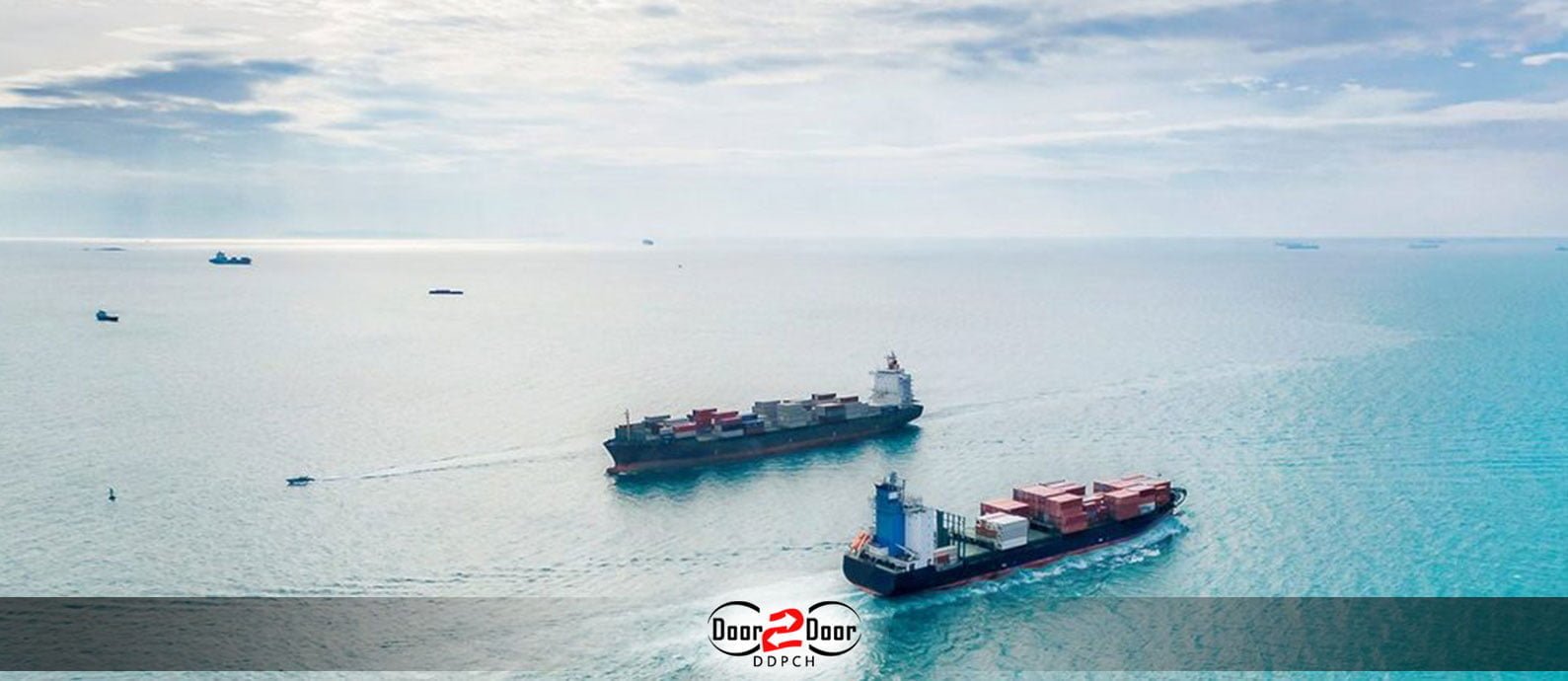Introduction for Shipping from China to Halifax
Shipping from China to Canada has a rich history, marked by centuries of trade and commerce between these two distant regions. The journey of goods from the bustling manufacturing hubs of China to the port city of Halifax has evolved over time, and today, it continues to play a vital role in global trade.
In this article, we will explore the process of shipping from China to Halifax , The consistent flow of goods through shipping from China to Halifax plays a pivotal role in bolstering Canada’s economy by enhancing trade, fostering economic growth, and contributing to employment opportunities in the Halifax region.
As a reputable logistics partner, DDPCH Shipping Company has been at the forefront of ensuring smooth and efficient shipping from China to Halifax. With our commitment to excellence and dedication to customer satisfaction, we have established ourselves as a trusted name in the industry. Our tailored solutions and comprehensive services have made us a preferred choice for businesses looking to navigate the complexities of international shipping.
Factors to consider when shipping From China to Halifax
When shipping from China to Halifax, it’s crucial to consider several factors to ensure a smooth and successful logistics process. These factors are of utmost importance as they can significantly impact the efficiency, cost-effectiveness, and overall success of your shipment.
considering factors when shipping from China to Halifax is essential to optimize the process, mitigate risks, and ensure the timely delivery of your goods.
Partnering with a reputable logistics company like DDPCH can provide expert guidance and support in navigating these complexities and ensuring a successful shipping experience. Let’s delve into some key considerations:
- Shipping Method: The choice of shipping method depends on several factors. For instance, if you’re shipping time-sensitive or high-value goods, air freight might be the best option due to its speed. Sea freight is ideal for bulk shipments, as it’s more cost-effective, although it takes longer. Rail freight offers a middle ground and can be suitable for certain goods or destinations.
- Shipping Costs: It’s crucial to calculate all associated costs, including transportation fees, customs duties, taxes, and any additional charges. This comprehensive cost analysis helps in effective budget planning and cost control, ensuring your shipping process remains financially viable.
- Shipping Duration: Consider how quickly you need your goods to reach Halifax. Air freight is the fastest, while sea and rail freight typically take longer. Balancing delivery speed with your budget constraints is vital to meet your business’s specific requirements.
- Customs and Regulations: To prevent delays and penalties, stay well-informed about customs regulations and import/export requirements in both China and Canada. Compliance with these regulations is essential for a smooth customs clearance process.
- Packaging and Labeling: Proper packaging and labeling are critical. Ensure your goods are well-packaged to withstand the rigors of transit, minimizing the risk of damage. Accurate and clear labeling helps customs authorities and carriers identify your goods efficiently, expediting the clearance process.
- Halifax Port Infrastructure: Consider the capabilities and capacity of the port in Halifax. Understanding the available resources and services can help you plan for unloading and distribution upon your cargo’s arrival. Knowing the port’s capacity can also prevent congestion-related delays.
- Climate and Seasonal Variations: Halifax experiences varying weather conditions throughout the year. If your shipment includes sensitive or perishable goods, understanding how weather might affect transit is crucial. Plan accordingly to protect your goods from extreme conditions.
- Local Partnerships: Collaborating with reliable local partners, such as DDPCH Shipping Company, is invaluable. They possess in-depth knowledge of both Chinese and Canadian shipping regulations and can provide essential on-the-ground support, including customs clearance assistance and local transportation services.
- Insurance: Consider obtaining shipping insurance to safeguard your goods from potential damage or loss during transit. Insurance provides peace of mind and financial security, ensuring you’re covered in case of unforeseen circumstances.
- Documentation: Ensure all required documentation, such as invoices, bills of lading, and customs paperwork, is complete and accurate. Errors or missing documents can lead to customs delays, potentially impacting your shipment’s timeliness.

Choosing the best shipping method for Halifax
Selecting the most suitable shipping method for Halifax involves evaluating various factors, including the type of goods, urgency, and budget constraints. For Halifax, a prominent port city on the east coast of Canada, sea freight is often a preferred choice due to its cost-effectiveness and established maritime infrastructure.
However, if time sensitivity is paramount, air freight could be considered, albeit at a higher cost. When looking at the volume of shipping from China to Halifax in a year, it’s noteworthy that this number can fluctuate significantly based on global economic conditions, trade agreements, and other factors.
Air freight from China to Halifax
Air freight from China to Halifax involves the utilization of cargo airports on both ends to facilitate the transportation of goods efficiently. In China, some of the major cargo airports include Shanghai Pudong International Airport, Beijing Capital International Airport, and Guangzhou Baiyun International Airport.
On the Halifax side, Halifax Stanfield International Airport plays a pivotal role in receiving and distributing air cargo. It boasts modern infrastructure and excellent connectivity, making it a strategic gateway for cargo entering Canada’s eastern provinces.
With dedicated cargo facilities and efficient customs procedures, Halifax Stanfield International Airport ensures smooth cargo operations for businesses shipping goods from China to Halifax via air freight.
It allows businesses to take advantage of the global reach and infrastructure provided by these airports to expedite the movement of their goods between these two distant locations.
Sea freight from China to Halifax
Sea freight from China to Halifax is a vital transportation method that forms the backbone of international trade between these two distant regions. Its importance lies in its cost-effectiveness, especially for bulk shipments of goods, which make up a significant portion of shipping from China to Halifax.
Sea freight offers economies of scale, making it a preferred choice for businesses looking to optimize their shipping costs while ensuring reliable and secure delivery. Additionally, Halifax’s well-established port infrastructure and connectivity play a crucial role in the smooth handling and distribution of goods, making sea freight a reliable and efficient choice for businesses seeking a balance between cost-efficiency and reliable shipping when moving products from China to Halifax.
DDP(delivered duty paid) From china to Halifax
DDP (Delivered Duty Paid) shipping from China to Halifax is a comprehensive logistics solution that offers numerous advantages and benefits to businesses. Under DDP terms, the shipper takes full responsibility for the entire shipping process, from pickup in China to final delivery in Halifax, including all associated costs, taxes, and customs duties.
This approach simplifies the process for the recipient in Halifax, as they receive the goods at their doorstep without having to worry about additional expenses or customs clearance. It enhances cost predictability, reduces administrative burden, and ensures a hassle-free experience, making DDP an attractive choice for businesses aiming to streamline their supply chain and enhance customer satisfaction when shipping goods from China to Halifax.
Express Shipping from China to Halifax
Express shipping from China to Halifax offers the advantage of unparalleled speed, making it ideal for time-sensitive shipments. The reliability and tracking capabilities of express carriers ensure timely and transparent deliveries. However, these benefits come at a higher cost compared to other shipping methods, and the limited cargo capacity may not be suitable for bulk shipments.
Additionally, the environmental impact and potential customs complexities should be considered. Businesses must carefully evaluate their priorities and budget constraints when opting for express shipping, ensuring it aligns with their specific requirements for moving goods from China to Halifax.
Rail Freight from China to Halifax
Rail freight from China to Halifax presents an intriguing option, especially for businesses seeking an efficient and environmentally friendly transportation method. It’s vital to consider factors like transit time and cost-effectiveness, as rail offers a middle-ground solution between sea and air freight. The benefits include reduced transit time compared to sea freight, making it suitable for goods that don’t require the speed of air transport but need to reach Halifax faster than by sea.
Additionally, rail freight can be a more sustainable choice due to lower emissions compared to air shipping. Overall, it offers a balanced approach that combines cost-efficiency, reasonable transit times, and environmental considerations when transporting goods from China to Halifax.
Road Freight from China to Halifax
Road freight from China to Halifax is a less common but feasible option for businesses seeking to transport goods overland. While it offers flexibility in terms of pickup and delivery locations, it comes with several challenges, such as the need for transcontinental road networks and border crossings.
The advantages include direct point-to-point transportation, making it suitable for certain types of cargo. However, the long distance and logistics complexities make road freight less common for this route compared to other transportation methods like sea, air, or rail. Careful consideration of the specific cargo requirements and logistical intricacies is essential when opting for road freight from China to Halifax.
Please note that costs and transit times can vary widely based on specific circumstances and service providers. It’s crucial to consult with shipping experts to obtain precise information tailored to your shipment’s requirements.
Air Freight vs. Sea Freight to Halifax
Air freight and sea freight are two primary shipping methods from China to Halifax, each offering distinct advantages and disadvantages. Air freight is the faster option, typically delivering goods within days, making it suitable for time-sensitive shipments like electronics or perishable goods. However, it comes at a higher cost per kilogram compared to sea freight, which is more cost-effective for larger shipments of non-perishable goods. Sea freight, while slower, is a cost-efficient choice for bulk cargo, offering economies of scale. For example, air freight might be ideal for shipping a small batch of high-end smartphones from China to Halifax, ensuring they reach the market quickly.
Example: A consumer electronics company in China needs to transport a new product line to Halifax, Canada.
Air Freight
Air freight is chosen when time is of the essence, ensuring that a limited quantity of the latest smartphones reaches the market quickly, capitalizing on consumer interest and gaining a competitive edge due to its high-speed delivery.
- Situation: The company needs to deliver a limited quantity of the latest smartphones to the market quickly.
- Advantage: Air freight is the preferred choice due to its high-speed delivery, ensuring that the smartphones reach retailers and customers within days.
- Benefit: This method meets the urgent demand, allowing the company to capitalize on consumer interest and gain a competitive edge.
- Consideration: Although air freight is more expensive, the speed justifies the cost for this time-sensitive shipment.
Sea Freight
Sea freight is the cost-effective option for transporting a substantial shipment of electronics equipment like home appliances or televisions, prioritizing cost savings over delivery speed, and requiring careful planning to align with production and distribution schedules.
- Situation: The company is exporting a substantial shipment of electronics equipment, such as home appliances or televisions.
- Advantage: Sea freight is the more cost-effective option for large shipments of non-perishable goods, even though it has a longer transit time.
- Benefit: By choosing sea freight, the company can achieve significant cost savings, which can be crucial for large-volume shipments.
- Consideration: While the delivery speed is not as critical in this scenario, careful planning and timing are necessary to ensure the shipment’s arrival aligns with the company’s production and distribution schedules.
In both cases, the company assesses its shipment’s size, urgency, and budget constraints to make an informed choice between air and sea freight. This decision optimizes the supply chain by balancing efficiency and cost-effectiveness, aligning with the specific needs of the business.
Estimated Costs and Transit Time for Shipping to Halifax
The estimated costs and transit time for shipping from China to Halifax can vary significantly depending on several factors, including the shipping method chosen, the origin in China, the type and volume of goods, customs procedures, and prevailing market conditions. Generally, air freight, being the fastest option, comes with higher costs compared to sea freight, which is more economical for larger shipments but involves longer transit times.
For example, air freight from a major Chinese city like Shanghai to Halifax may cost considerably more but can deliver goods within days, while sea freight could be more cost-effective but may take several weeks. It’s crucial for businesses to consult with logistics experts and carriers to obtain accurate, up-to-date quotes tailored to their specific shipping needs and circumstances.
Keep in mind that these are rough estimates, and actual costs and transit times will depend on factors like shipment size, weight, origin in China, specific carriers, customs processes, and other variables. It’s crucial to obtain accurate quotes from logistics providers for your specific shipping needs.

Essential Documentation for Shipping to Halifax
Essential documentation for shipping to Halifax, Canada, includes a combination of general shipping documents and specific customs documentation. Among the essential documents are the commercial invoice detailing the goods, their value, and origin; a bill of lading or airway bill serving as proof of shipment and title to the goods; a packing list describing the contents and packaging; a certificate of origin, especially for preferential trade agreements; and insurance certificates.
Our experts at DDPCH understand that each shipment is unique and may require specific documentation tailored to the nature of the goods and their regulatory requirements. We guide our clients through the process, ensuring that they provide all necessary documents, including a well-prepared commercial invoice, a clear bill of lading or airway bill, a detailed packing list, certificates of origin when applicable, and proper insurance coverage. Our commitment to precise customs documentation, including the use of Canada Customs Invoices (CCIs) where required, guarantees that shipments smoothly pass through customs and adhere to all Canadian import regulations.
General Shipping Documentation
General shipping documentation encompasses a crucial set of paperwork that forms the backbone of any international shipment to Halifax, Canada. The commercial invoice provides a comprehensive overview of the goods, specifying their value, origin, and terms of sale. The bill of lading or airway bill serves as concrete proof of shipment and ownership, ensuring smooth transit and delivery.
- Commercial Invoice: This document serves as a comprehensive record of the shipped goods. It includes a detailed description of the items, their value, country of origin, and the terms of sale. Customs authorities use it to assess duties and taxes.
- Bill of Lading (B/L) or Airway Bill (AWB): These documents are issued by the carrier and provide crucial proof of shipment and title to the goods. The B/L is used for sea freight, while the AWB is for air freight. They also include essential information about the goods, the shipper, and the consignee.
- Packing List: The packing list offers a meticulous breakdown of the shipment’s contents. It specifies the types of items, packaging details, quantities, and dimensions. This document aids in cargo handling and customs inspection.
- Certificate of Origin: Particularly significant when dealing with preferential trade agreements, this certificate indicates the origin of the goods, verifying where they were produced. It can impact the application of tariff preferences.
- Insurance Certificates: These certificates provide documentation of cargo insurance coverage. They safeguard against potential damage or loss during transit, assuring all parties involved that the shipment is protected.
Customs Documentation
Customs documentation is a vital component of the shipping process when transporting goods to Halifax, Canada. Among these documents, the Canada Customs Invoice (CCI) plays a central role, providing essential customs details necessary for accurate assessment of duties and taxes. The bill of sale serves as evidence of the transaction value of the goods, aiding in customs valuation. Additionally, various certificates and permits may be required depending on the nature of the goods, such as phytosanitary certificates for agricultural products or permits for controlled items.
These documents are instrumental in ensuring smooth customs processes, compliance with Canadian import regulations, and the lawful entry of goods into Halifax, while minimizing the risk of delays or penalties. Properly prepared customs documentation is crucial for a hassle-free shipping experience.
- Canada Customs Invoice (CCI): The CCI is a specialized invoice tailored for customs purposes. It includes specific customs details and is mandatory for proper customs clearance. This document is crucial in ensuring accurate assessment of duties and taxes.
- Bill of Sale: This document serves as evidence of the transaction value of the goods. It provides details about the financial aspects of the sale and is important for valuation purposes by customs authorities.
- Certificates and Permits: Depending on the nature of the goods being shipped, various certificates and permits may be necessary. These can include phytosanitary certificates for agricultural products, permits for controlled items, and other regulatory documents. Compliance with these requirements is essential for smooth customs processes and adherence to Canadian import regulations.
Reviewing Top Shipping Providers for Halifax
When reviewing top shipping providers for Halifax, it’s essential to consider the benefits that the best providers offer. The leading shipping providers prioritize reliability, ensuring that your goods reach Halifax on time and in good condition. They often have extensive global networks, enabling seamless coordination of shipments from various origins in China to Halifax. The best providers offer a range of shipping methods to accommodate different cargo types and timelines, whether it’s expedited air freight for time-sensitive goods or cost-effective sea freight for larger shipments.
They also excel in handling customs documentation, ensuring compliance with Canadian import regulations and efficient customs clearance. here’s a generalized table highlighting some well-known shipping providers :
This table highlights several prominent shipping providers, each offering distinct benefits.

How to Handle Customs Clearance in Halifax?
Handling customs clearance in Halifax, Canada, is a critical step in the international shipping process. Ensuring smooth clearance requires meticulous preparation, adherence to regulations, and cooperation with customs authorities. Here’s a comprehensive guide on how to handle customs clearance in Halifax for shipping from China to Halifax :
- Preparation and Documentation: Start by ensuring that all required documentation is complete and accurate. This includes the Canada Customs Invoice (CCI), commercial invoice, packing list, certificates of origin, and any specific permits or certificates relevant to your shipment.
- Select a Customs Broker: Consider hiring a licensed customs broker with expertise in Canadian customs regulations. They can assist with document preparation, classification of goods, and submission to customs authorities.
- Declare Your Shipment: Submit your shipment information electronically through the Canada Border Services Agency’s (CBSA) systems. This electronic pre-arrival system expedites customs clearance.
- Compliance with Regulations: Ensure that your shipment complies with all Canadian import regulations. Be aware of any specific requirements for your type of goods, including tariffs, duties, and taxes.
- Goods Valuation: Determine the accurate value of your goods based on the transaction value or an acceptable valuation method according to customs regulations.
- Inspection and Examination: Customs authorities may choose to inspect or examine your shipment. Be prepared for this possibility and cooperate fully to facilitate the process.
- Payment of Duties and Taxes: Pay any applicable duties, taxes, and fees promptly to avoid delays. Customs brokers can help you calculate these costs accurately.
- Release of Goods: Once customs clearance is complete and all obligations are met, your goods will be released and can proceed to their final destination.
- Monitor Changes in Regulations: Stay informed about any changes in Canadian customs regulations or trade agreements that may affect your shipments. Regularly update your customs broker on changes in your products or business practices.
- Maintain Compliance Records: Keep thorough records of all customs-related documents, including invoices, bills of lading, customs declarations, and correspondence with customs authorities. These records are essential for compliance and potential audits.
- Seek Professional Guidance: If you’re unsure about any aspect of customs clearance or face complex situations, seek professional guidance from customs brokers, trade consultants, or legal experts.
Navigating customs clearance in Halifax, Canada, can be a complex process, but with careful preparation and compliance with regulations, you can ensure that your shipments move efficiently through customs, reducing the risk of delays or penalties. Collaboration with customs experts and continuous monitoring of regulatory changes will help you maintain a smooth and compliant shipping process to and from Halifax.
Avoiding Common Mistakes When Shipping to Halifax
Avoiding common mistakes when shipping from China to Halifax is crucial for a seamless logistics process. One of the most prevalent errors is inadequate documentation, which can lead to customs delays or penalties. Ensure all necessary paperwork, such as the Canada Customs Invoice (CCI), commercial invoice, and certificates of origin, is complete and accurate. Another common mistake is not staying updated on Canadian customs regulations, leading to non-compliance. Keep abreast of changes and requirements specific to shipping to Halifax. Failing to choose the appropriate shipping method, whether air, sea, rail, or road, based on the nature of your cargo and timeline can also result in inefficiencies and increased costs.
with proactive solutions can lead to more efficient and error-free shipping from China to Halifax, ensuring smoother logistics operations and compliance with Canadian import regulations.
To ensure a smooth shipping process from China to Halifax , consider these tips and tricks:
- Consolidation: Consider consolidating smaller shipments into larger ones to maximize cost-efficiency, especially for sea freight.
- Incoterms: Clearly define Incoterms (International Commercial Terms) in your contracts to establish responsibilities for costs, risks, and the transfer of goods between parties.
- Hazardous Materials: If shipping hazardous materials, adhere to strict regulations and ensure proper labeling, packaging, and documentation.
- Customs Classification: Accurately classify your goods according to the Harmonized System (HS) code to determine applicable duties and taxes.
- Landed Cost Analysis: Conduct a landed cost analysis to understand the total cost of importing your goods, including shipping, duties, taxes, and handling fees.
- Supply Chain Visibility: Use supply chain visibility tools to track and manage your shipments in real-time, allowing for proactive problem-solving.
- Consistent Communication: Maintain consistent communication with your suppliers to coordinate production schedules with shipping timelines.
- Quality Control: Implement quality control measures in China to ensure that your goods meet specifications and minimize the risk of rejections upon arrival in Halifax.
- Port Selection: Choose the most suitable port of entry in Halifax based on your final destination and transportation requirements.
- Environmental Considerations: Be mindful of environmental regulations and sustainability practices when shipping, especially if your cargo includes sensitive materials.
- Continuous Improvement: Conduct post-shipment evaluations to identify areas for improvement and refine your shipping processes for future shipments.
- Local Partnerships: Develop strong partnerships with local logistics providers and customs brokers in Halifax to facilitate the smooth transition of your goods into the local market.
- Emergency Response Plan: Prepare an emergency response plan to address unforeseen situations such as natural disasters or geopolitical issues that could impact your shipments.
By incorporating these additional tips into your shipping strategy, you can enhance the reliability, efficiency, and overall success of your shipping from China to Halifax while minimizing potential challenges and setbacks.
Conclusion: Simplifying Shipping to Halifax
Shipping from China to Halifax, a vibrant port city in Canada’s Nova Scotia province, involves a series of logistical considerations and strategic decisions. Whether you’re shipping electronics, textiles, or any other products, staying informed, proactive, and adaptable in an ever-evolving global trade landscape is essential.
DDPCH Shipping Company is your trusted partner for a streamlined and hassle-free experience. We understand the intricacies of international logistics and customs clearance, ensuring that your goods reach Halifax with precision and efficiency.
With a commitment to accurate documentation, tailored shipping solutions, and expert customs clearance services, we simplify the complex process of shipping to Halifax, allowing you to focus on your core business. Whether by air, sea, rail, or road, our comprehensive logistics solutions and dedicated professionals ensure that your cargo arrives safely and on time.
If you want to know more about shipping to different cities in Canada, such as Vancouver , Toronto and Montreal , you can explore our blog for detailed information and helpful insights on these topics.
Several essential factors should be considered when shipping from China to Halifax. These include selecting the right shipping method based on cargo type, urgency, and budget; calculating and budgeting for all shipping costs, including transportation, customs duties, taxes, and additional fees; determining the acceptable delivery timeframe to balance cost and speed; ensuring compliance with customs regulations and import/export requirements in both China and Canada; properly packaging and labeling goods to protect them and facilitate customs clearance
You can choose from various shipping methods, including air freight, sea freight, rail freight, and road freight, depending on your cargo type, urgency, and budget.
The main sea ports in Halifax, Nova Scotia, include the Port of Halifax and the Ceres Container Terminal. These ports handle a wide range of cargo, including containerized goods, bulk cargo, project cargo, and breakbulk shipments. The Port of Halifax is known for its efficient container handling facilities, making it a crucial gateway for international trade and commerce in the Atlantic region.
The primary cargo airports serving Halifax are Halifax Stanfield International Airport (YHZ) and Halifax Downtown Waterfront Heliport (CHZ).
DDP (Delivered Duty Paid) shipping is a comprehensive shipping service where the shipper takes full responsibility for all aspects of the shipment, including customs clearance, duties, and taxes, ensuring that the goods are delivered to the recipient’s door in Halifax. The advantages of DDP shipping include reduced administrative burden, simplified logistics, and cost transparency, as all fees and charges are included upfront.
Several factors affect the costs of shipping goods from China to Halifax, including the chosen shipping method, cargo type, size, distance, and route. Urgency, customs duties, taxes, and packaging quality also impact expenses. Incoterms, currency exchange rates, and fuel prices can affect costs, as can additional services like insurance and storage. Seasonal variations and regulatory changes further influence shipping expenses.
The average transit time for shipments from China to Halifax can vary depending on the shipping method chosen, ranging from several days for air freight to several weeks for sea freight. To estimate the delivery timeframe for your cargo, consider the shipping method, the distance between the origin and destination, any potential delays, and consult with your logistics provider for a more precise estimate based on your specific shipment details.
When choosing a shipping provider, consider your specific needs, including cargo type, urgency, and budget, and select the one that best aligns with your requirements for shipping to Halifax.
here are five top shipping providers for shipping from China to Halifax:
DDPCH Shipping Company
DHL
FedEx
UPS
Maersk Line
The required documents include the Canada Customs Invoice (CCI), commercial invoice, packing list, certificates of origin, and bill of lading or airway bill. Additional permits or certificates may be necessary depending on the nature of the goods being shipped.
Common mistakes when shipping goods from China to Halifax include inadequate documentation, labeling errors, choosing the wrong shipping method, and non-compliance with customs regulations. Inadequate or inaccurate documentation can lead to customs delays, while labeling errors can cause issues with product identification and safety. Choosing an inappropriate shipping method based on cargo type, urgency, and budget can result in delays and increased costs. Failing to stay informed about and comply with Canadian customs regulations may lead to customs delays, fines, and legal complications. It’s essential to address these common pitfalls to ensure a smooth shipping process from China to Halifax.






